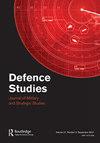A study on combat motivation: how soldiers get immune to the perpetual fear of death
Q1 Arts and Humanities
引用次数: 0
Abstract
ABSTRACTThe present review addresses the effectiveness of combat motivation and how it can bring positive change that helps the Military services to improve and be innovative in the current tough environment. It aimed to identify the factors that influence the soldiers to get immune from the perpetual fear of Death. A sample of 415 soldiers has been conducted with the help of a self-structured interview. Exploratory Factor Analysis (EFA) highlights duty, honor, and country; the military slogan and war cry; leadership& training; Regiment pride or community Pride;The desire to win war and go home; Avenging The Matrydom & Atitude Towards Enemy; Personal Gratification and commitment to Brothers in ARMS & Commitment towards nation are the major Combat Motivational factors in the Indian army. Combat Motivation is confirmed as an eighth factor model in the army by confirmatory factor analysis (CFA). The study suggests using commitment-based leadership strategies and tactics in the army that increase the motivation to get immune from the perpetual fear of Death of soldiers from the selected sample. The information obtained from this study can provide a framework to assist Army leaders, Commanders, and training and development for future soldiers.KEYWORDS: Combat motivationthe military systemIndian armymartyrs Disclosure statementNo potential conflict of interest was reported by the author(s).Additional informationNotes on contributors ArchanaArchana, is a PhD Research Scholar in the Department of Management Studies, Graphic Era Deemed to be University, Dehradun, India.OP SoniOP Soni, Maj Gen. Prof.(Dr) VSM ,ndc is a Professor and Dean of Department of Management Studies, Graphic Era Deemed to be University, Dehradun, India.Megha OjhaMegha Ojha, is a PhD Research Scholar in the Department of Management Studies Graphic Era Deemed to be University, Dehradun, India.一项关于战斗动机的研究:士兵如何免于对死亡的永久恐惧
摘要本综述探讨了作战动机的有效性,以及它如何带来积极的变化,帮助军队在当前严峻的环境中改进和创新。它旨在找出影响士兵免于对死亡的永久恐惧的因素。在自组织访谈的帮助下,对415名士兵进行了抽样调查。探索性因素分析(EFA)强调责任、荣誉和国家;军事口号和战争口号;领导力培训;团体的骄傲还是团体的骄傲;赢得战争回家的愿望;复仇之母&对敌人的态度个人满足和对兄弟的承诺以及对国家的承诺是印度军队主要的战斗动机因素。通过验证性因素分析(CFA),确定了作战动机是军队中的第八个因素模型。该研究建议在军队中使用基于承诺的领导战略和战术,以增加选定样本中士兵对死亡的永久恐惧的免疫动机。从这项研究中获得的信息可以为陆军领导人、指挥官以及未来士兵的训练和发展提供一个框架。关键词:战斗动机;军事系统;印度军队烈士披露声明作者未报告潜在的利益冲突。ArchanaArchana是印度德拉敦图形时代大学管理研究系的博士研究学者。OP SoniOP Soni, Prof.(Dr) VSM,ndc,印度德拉敦图形时代大学管理研究系教授兼系主任。Megha Ojha,印度德拉敦图形时代大学管理研究系博士研究学者。
本文章由计算机程序翻译,如有差异,请以英文原文为准。
求助全文
约1分钟内获得全文
求助全文

 求助内容:
求助内容: 应助结果提醒方式:
应助结果提醒方式:


